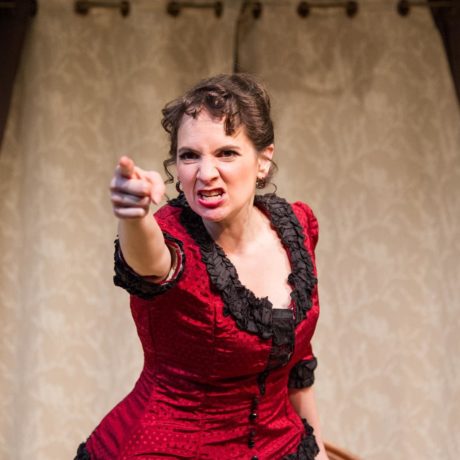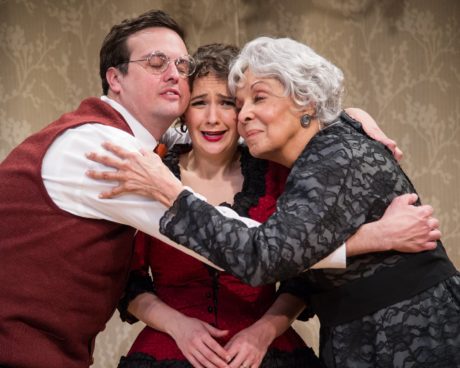What if your favorite dramatic heroine could – just for once – alter her tragic fate? That’s the question posed by playwright Jon Klein in the Washington Stage Guild’s production of Resolving Hedda. The iconic Hedda Gabler is back, but this time, rather than shooting herself at the end of the fourth act, she resolves to live. How can she escape playwright Henrik Ibsen’s perfectly realized 19th-century drama? Where are the inflection points at which she can alter its trajectory and bring the play to a happier conclusion? It is not an easy task, but it sure is entertaining to watch.

Under the direction of WSG Associate Artistic Director Steven Carpenter, Klein’s clever play is performed by a host of talented actors who stretch and exaggerate Ibsen’s characters. Kelly Karcher as Hedda is a marvel, charging seamlessly back and forth across the fourth wall to involve the audience in her struggle to liberate Hedda from her creator’s control. Clearly, she has watched the position of women evolve since Hedda Gabler premiered in 1891. Hedda peppers her insights with references to Wikipedia, Oprah and phone apps, among other essential parts of our 2019 lives. Even Washington’s own Kellyanne Conway makes her way into Klein’s script.
But despite her modern sensibilities, Hedda knows her limits. Ever the prisoner of Ibsen’s perfect construction, she struggles to find room to change the narrative. She has some pesky, pivotal props to contend with, including the twin pistols and manuscript that are central to the original play’s startling outcome. Even more importantly, how can she exert control over the other characters? She implores her husband George Tesman not to leave the stage. Bad things happen whenever he’s off in the wings. George vows to stand by his skittish wife and then promptly departs as directed by Ibsen.
The woeful, wonky George is wonderfully played by Jamie Smithson. He flaps about, completely deaf to Hedda’s increasing frustration. He finally finds purpose in reconstructing the futurist manifesto of his friend and rival Eilert, who is played with hilarious preening by Matthew Castleman. Steve Beall turns up the despicability factor as Judge Brack, the leering villain who Ibsen uses to trap and defeat Hedda. Ever the fierce wit, our heroine urges him to grow a mustache just so he can twirl it.
Emelie Faith Thompson as the comically bouffanted and loyal Thea and the esteemed Jewell Robinson as Aunt Julia round out an excellent cast. Missing from the original is the maid Berta, who Hedda tartly informs us is inessential and thus, eliminated.
Klein maneuvers his story with great skill. Hedda, the only character able to step out of the play and into the 21st century, contrasts comically with the others who continue to follow Ibsen’s commands. The structure is especially effective at the beginning of the play, when Hedda starts out on her mission, and in the final scenes, when she comments on the outcome. Throughout, however, Klein’s quick-witted writing elicits a steady stream of laughter. You don’t have to know the original Hedda Gabler to revel in this take-off, but if you have seen an original version, you may enjoy it even more.

The Washington Stage Guild production is enhanced by a handsome set design by Tara Lyman-Dobson, who is making her WSG debut. Resident designer Sigrid Johannesdottir gives us gorgeous period costumes with an occasional modern touch. Frank DiSalvo provided the excellent sound and Marianne Meadows designed the effective lighting.
Ibsen’s heroines seem ripe for reconsideration. Not only has Hedda reappeared in Klein’s 2017 play, but Nora Helmer, the unforgettable wife and mother in A Doll’s House, returns home 15 years after leaving her family as a feminist novelist in Lucas Hnath’s well-received A Doll’s House, Part 2, which premiered the same year. As women continue to break glass ceilings, it’s fascinating to imagine how Ibsen’s strong females might change through time or in Hedda’s case, re-route themselves through the original narrative.
Running Time: Two hours, with one 15-minute intermission.
Resolving Hedda plays through April 14, 2019, at the Washington Stage Guild, performing at the Undercroft Theatre of Mount Vernon United Methodist Church – 900 Massachusetts Avenue NW, Washington, DC. For tickets, call the box office at (240) 582-0050, or purchase them online.





whoah this blog is excellent i really like studying your articles.
Keep uup the goid work! You recognize, a lot of individuals are hunting around for this
information, you caan help them greatly.